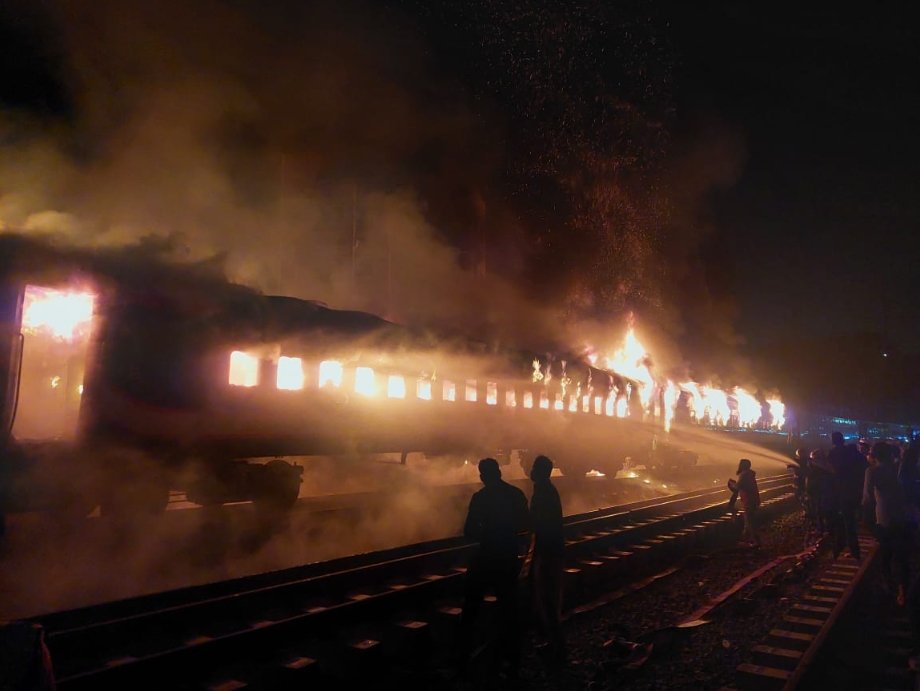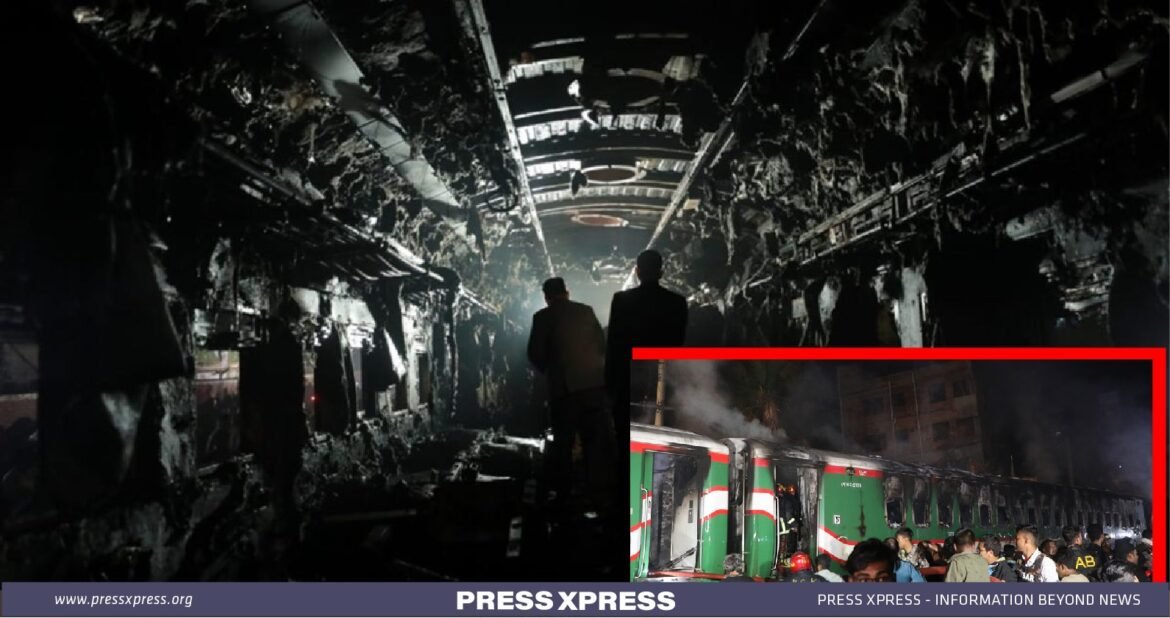The most reliable mode of transportation for the general population in a country is the train. This means of transportation not only saves time but is also cost-effective. However, recent incidents of arson attacks on trains have resulted in 8 casualties. The Benapol Express arson attack, on Gopibag, occurring just before the election on January 5, 2024, has left many pondering the motives of those responsible for these incidents.
You can also read: Propaganda against PM Soars in Cyberspace as Election Nears
During the arson attack on the Benapole Express train on January 5th, three coaches were set on fire, resulting in four fatalities and eight injuries. Meanwhile, multiple Molotov cocktail blasts were reported in Comilla City. As the nation approached voting day, opposition activists targeted polling centers across Bangladesh. Schools, serving as polling centers, were the primary targets of these arson attacks. Numerous polling centers, predominantly located in schools, were set on fire in Chittagong, Feni, and Rajshahi, with some being destroyed. Additionally, a time bomb was discovered in a bus in Narayanganj. Even in A F Rahman Hall, Dhaka University 4 cocktails were blasted on the evening of 5th January.

In November 2023, escalating political tensions erupted into protests and violence in Bangladesh, leaving the country on edge in anticipation of the general elections. Protesters set buses on fire and clashed with security forces in various locations. Despite the government’s efforts to maintain a safe environment for citizens, troublemakers persist in instigating violence.
These incidents of violence during elections are a significant concern as they undermine the democratic process. It is crucial to advocate for peaceful and equitable elections to ensure the stability and development of the country.
In the last 18 hours, reports indicate 14 arson attacks occurring nationwide. In Rajbari, a village policeman lost his life, and six vehicles, nine structures, a Buddhist temple, and an educational institute were set ablaze.
Statements



The train incidents timeline
Amid a series of strikes and blockades organized by the BNP and like-minded parties, Bangladesh experienced five significant incidents of rail sabotage. These events resulted in the loss of five lives and inflicted injuries on numerous individuals, including railway workers. The damage included the gutting of seven railway coaches by fire, along with the destruction of eight additional coaches and an engine.
The first incident occurred on November 16 when the Panchagarh Express, stationed at Gharinda railway station in Tangail, fell victim to an arson attack, resulting in the destructive blaze of three compartments.
Subsequently, in the early hours of November 19, two compartments of the Jamuna Express at Jamalpur’s Sarishabari railway station were set ablaze, marking the second train incineration during the BNP’s blockade and hartal program.
On November 23, an arson incident transpired aboard the Upaban Express, an intercity train at Sylhet Railway Station, with the fire originating in the AC chair compartment around 9:30 pm, as confirmed by Sylhet railway station manager, Md Nurul Islam.
A distressing event unfolded on November 27 at Ishwardi Junction in Pabna, where an unidentified group set fire to a stationed train around 8:30 pm. Fortunately, there were no reported injuries, and two fire service units swiftly extinguished the flames within thirty minutes.

Moving forward to December 13, an intentional act of removing a 20-foot stretch of rail track led to the derailment of the Dhaka-bound Mohanganj Express, resulting in one reported death. Subsequently, on December 18, the same train faced another tragic incident as arsonists set three coaches ablaze near Dhaka’s Tejgaon Railway Station, resulting in at least four casualties, including a woman and her 3-year-old son.
On the other hand, The Rupsha Express train, from Chilahati to Khulna, narrowly escaped the accident when the rail sleepers were removed near Birampur, Dinajpur on December 19.
Confronted with a waning reservoir of public cooperation, the BNP finds itself increasingly agitated, culminating in the declaration of a non-cooperation movement until the scheduled election on January 7.
The nation watches with a mix of concern and anticipation as the different people navigate these tumultuous waters, its actions continuing to shape the intricate narrative of Bangladesh’s political landscape.
BNP and the issues with their Political Background
In 2006, amid political turmoil and accusations of electoral fraud, Khaleda Zia’s government concluded its term, leading to a caretaker government organizing new elections. In 2008, the Awami League’s victory in parliamentary elections made the BNP the opposition. In 2014, the BNP boycotted elections, citing fairness concerns, but the Awami League secured a majority. In 2013-2014, the BNP’s 93-day campaign of violence caused disruptions, and in 2015, 52 days of hartals led to significant economic losses and destruction.
In 2018, the BNP participated in elections but performed poorly, leading to the Awami League retaining power. By 2021, internal divisions and legal challenges added to the BNP’s struggles, contributing to ongoing political tensions. The party’s history includes supporting militant activities, notably under Tarique Rahaman’s leadership, damaging its political reputation. These actions, violating humanitarian rights, have drawn international attention, negatively impacting Bangladesh’s global image. The BNP’s past support for Islamist militants, like Mufti Abdul Hannan, has led to accusations of terrorism, even resulting in Canada declaring the BNP a terrorist organization. Continuous disregard for the well-being of the people has eroded public support for the BNP.
The recent surge of violence in Bangladesh, particularly targeting public infrastructure, reveals a troubling narrative ahead of the elections. This systematic disruption, especially during the pre-election period, undermines the democratic process and citizens’ rights to a peaceful electoral environment. The involvement of opposition activists, notably from the BNP, highlights the complexities of Bangladesh’s political landscape. The country is grappling with political desperation, jeopardizing its stability, safety, and democratic ethos. As Bangladesh navigates these turbulent waters, the actions of political entities like the BNP continue to shape the country’s political landscape. It is imperative to ensure that democratic values prevail and citizens’ rights are protected against disruptive tactics that hinder the nation’s progress toward peace and prosperity. The need for peaceful, fair, and equitable elections, the bedrock of the nation’s progress, cannot be overstated.


